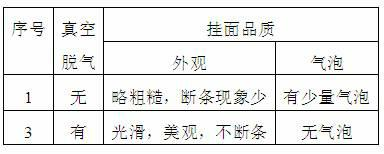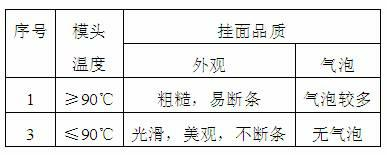Processing method of whole grain vermicelli
A processing method and whole grain technology, which is applied in the field of processing whole grain dried noodles, can solve the problems of unreported industrial production and achieve the effect of wide processing range, fine surface and soft taste
- Summary
- Abstract
- Description
- Claims
- Application Information
AI Technical Summary
Problems solved by technology
Method used
Image
Examples
Embodiment 1
[0032] (1) Whole wheat that has been dried, cleaned, graded, stone-removed, and milled is subjected to ultra-fine pulverization with a mechanical impact shearing mill to obtain whole-wheat ultra-fine powder with a fineness of less than 74 μm;
[0033] (2) Take the prepared whole wheat superfine powder, adjust the moisture content of the material to 10%, then feed the material into the twin-screw extruder, and form it into strips by gelatinization and extrusion. 60°C, 80°C in the third zone, 80°C in the fourth zone, 120°C in the fifth zone, and 70°C in the sixth zone. The extruded noodles are hang-dried (tunnel drying), cooled, cut into strips, and packaged to obtain dried noodle products; The screw extruder has a vacuum degassing device.
Embodiment 2
[0035] (1) The brown rice that has been dried, cleaned, graded, stone-removed, and coarsely crushed is ultrafinely pulverized by an air-flow ultrafine pulverizer to obtain brown rice ultrafine powder with a fineness of less than 74 μm;
[0036] (2) Take the obtained brown rice superfine powder, adjust the moisture content of the material to 30%, and then feed the material into the twin-screw extruder for one-time gelatinization and extrusion to form strips. The extrusion conditions are set at 50°C in the first zone and 70 in the second zone. ℃, 100 ℃ in the third zone, 100 ℃ in the fourth zone, 130 ℃ in the fifth zone, and 80 ℃ in the sixth zone. The press has a vacuum degassing device.
Embodiment 3
[0038] (1) The oats that have been dried, cleaned, graded, stone-removed, and pulverized are subjected to ultra-fine pulverization by a ball mill to obtain oat ultra-fine powder with a fineness of less than 74 μm;
[0039] (2) Take the obtained superfine oat powder, adjust the moisture content of the material to 50%, and then feed the material into the twin-screw extruder for one-time gelatinization and extrusion to form strips. The extrusion conditions are set to 60°C in the first zone and 80°C in the second zone °C, 120 °C in the third area, 120 °C in the fourth area, 150 °C in the fifth area, and 90 °C in the sixth area. The extruded noodles are hang-dried (hot air drying), cooled, cut into strips, and packaged to obtain dried noodle products; wherein, the twin-screw extruder The press has a vacuum degassing device.
PUM
| Property | Measurement | Unit |
|---|---|---|
| Fineness | aaaaa | aaaaa |
Abstract
Description
Claims
Application Information
 Login to View More
Login to View More - R&D
- Intellectual Property
- Life Sciences
- Materials
- Tech Scout
- Unparalleled Data Quality
- Higher Quality Content
- 60% Fewer Hallucinations
Browse by: Latest US Patents, China's latest patents, Technical Efficacy Thesaurus, Application Domain, Technology Topic, Popular Technical Reports.
© 2025 PatSnap. All rights reserved.Legal|Privacy policy|Modern Slavery Act Transparency Statement|Sitemap|About US| Contact US: help@patsnap.com



